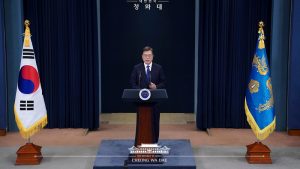South Korean President Moon Jae-in delivered a speech on Sunday to mark the third anniversary of his inauguration (full English text here). Weeks after his fellow progressives put up a historic showing in South Korea’s mid-term National Assembly election in April, Moon spoke largely of the national economy and the ongoing response to the COVID-19 pandemic.
Moon’s speech spent little time on foreign affairs and especially on North Korea, reflecting the mostly marginal position of the inter-Korean issue at the moment for the Blue House. There has been no shortage of headlines concerning the inter-Korean relationship; North Korea just days ago blasted the South for naval exercises that it said violated the terms of the September 2019 Comprehensive Military Agreement, for instance. Seoul was caught off guard, too, by sudden firing by North Korean troops on one of its guardposts recently.
With just two years of his single five-year term remaining, Moon hasn’t written off North Korea as an agenda item entirely. Moon no doubt remembers his time in the administration of one of his progressive predecessors, Roh Moo-hyun, who embarked on a remarkable bout of inter-Korean rapprochement toward the end of his own term, in 2007. Roh met Kim Jong Il for the second-ever inter-Korean summit, but given the eventual turnover in the Blue House afterwards, whatever momentum emerged from that summit quickly dissipated.
During Sunday’s speech, Moon’s approach to North Korea largely represented continuity. The agenda on North Korea that the Blue House established in the aftermath of the Panmunjom (April 2018) and Pyongyang (September 2018) summits remains in place, with the South Korean president still emphasizing inter-Korean cooperation. Seoul’s position then was to pursue basically any and all types of inter-Korean cooperation that would be permissible under existing United Nations sanctions; that remains the case.
Moon emphasized that he hoped “that South and North Korea will move toward a single community of life and a peace community by cooperating on human security.” As in February, the South Korean president placed the COVID-19 pandemic at the center of his inter-Korean pitch, emphasizing that the pandemic could be an opportunity for cooperation. The inter-Korean détente, from Seoul’s point of view, is here to stay.

































